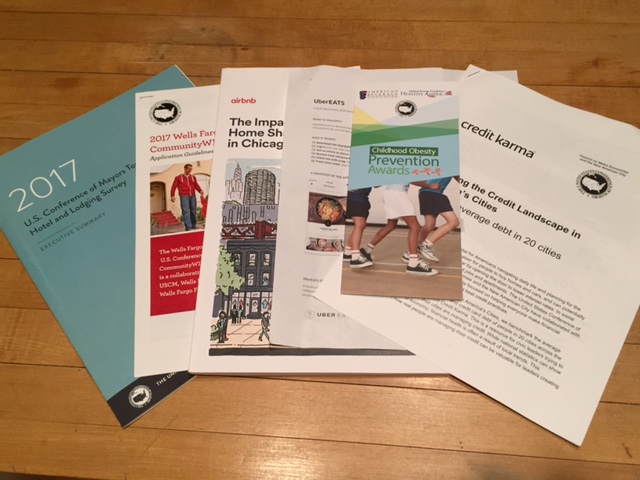Connecting state and local government leaders
Commercial and non-profit groups seek favor and recognition at the U.S. Conference of Mayors winter meeting in the nation’s capital.
WASHINGTON — The mezzanine corridors at the Capital Hilton were lined with table-top displays from Uber, Airbnb, the American Beverage Association and other organizations seeking goodwill, more business and favorable regulatory treatment from the nation’s mayors.
The presence of these and other interest groups testified both to the power of the mayors to affect commercial interests and to the ability of the U.S. Conference of Mayors to enlist their financial support for its winter meeting held here during the presidential inauguration week.
Contributing the most, and earning the “Title Sponsor” designation on the cover of the conference brochure, was Ford Motor Co. Its sponsor page declared that “to expand its business model, Ford is aggressively pursuing emerging opportunities in electrification, autonomy and mobility.” The strategy was explained in detail by company executive chairman Bill Ford, who was interviewed during a plenary session by USCM president Mick Cornett, the mayor of Oklahoma City. Ford’s vision of the future was compelling if distant. Of course, in the here and now, Ford is a major supplier of fleets for municipal and other government entities.
Airbnb representatives were doing their best from their table in a hotel corridor to persuade attendees that their company was contributing mightily to the economic welfare of cities around the country and the world. Their most ambitious study seemed to be of Chicago, its conclusions expansively described in an expensively printed, four-color brochure running 44 pages in length. In Chicago, during the 12 months ending in June 2015, 4,550 hosts earned $34 million by providing lodging for 165,800 guests, the study averred. In the meantime, 172,000 Chicagoans rented Airbnb lodging in other cities, the report said. The Windy City earned $209 million as guests bought goods and services, and this supported 2,100 jobs, said the study, which also touted reductions in waste, energy and water usage and greenhouse emissions when compared to what would have occurred had the people stayed “in traditional accommodation options.”
In another handout, Airbnb projected more than 10,000 “guest arrivals” in the Washington, D.C., area for the presidential inauguration, more than seven times the number four years ago and told the story of Lyudmilla Tregubova, a Capitol Hill resident looking forward to renting part of her house for a third presidential inauguration.
Complaints have surfaced in some cities about the quality and safety of Airbnb offerings, plus impacts on housing availability. The company isn’t nearly as closely regulated as the competing hotel industry—nor do its participants routinely pay lodging taxes.

Although it was not a sponsor of the meeting, the American Hotel and Lodging Association released a study, done jointly with the USCM, on Jan. 18, documenting the industry’s claim that it is “a critical component of the local economies of cities across the nation.”
The association sent its government affairs vice president, Jason Brewer, to speak at a meeting of the Tourism, Arts, Parks, Entertainment and Sports Committee, whose chairman is Mayor Mitch Landrieu of New Orleans.
Hotels create some 8 million jobs, Brewer said, and pay wages totalling $355 billion. Nine out of 10 mayors participating in the jointly sponsored survey said they would like additional hotels in their cities. Brewer pointedly noted that while Airbnb had “finally” said its activities were contributing $132 million in taxes to local coffers, the hotel industry had paid $167 billion in taxes in the most recent year on record.
Landrieu’s committee also got an update on gambling. Geoff Freeman, the president of the American Gaming Association, noted the rapid spread of casino gambling—now allowed in 40 states. He remarked that few would have placed bets a year or two ago that gambling destination Las Vegas would attract a National Hockey League team, be in the running for an NFL franchise and serve as the site of the final presidential debate—nor that the 45 president of the United States would be a former casino owner.
The industry is a major taxpayer, contributing some $40 billion a year to government coffers. Brewer predicted that contribution would soon be climbing as more casinos open and sports betting—now allowed only in Nevada—became legal in other states. A federal law banning betting on professional and colleges sporting events, except in Nevada, is a top target for Freeman’s association, and he told Route Fifty that the outlook was favorable for changing the law in the new Congress.
Hard by the Airbnb display on the Hilton mezzanine was another by Uber, another major sharing economy player that’s seen its share of controversy with state and municipal regulators.
Uber was distributing promotional literature to USCM attendees, including a study that used Uber data to show how interruptions in Metrorail service had increased commuting times in the Washington, D.C. metro area.
The American Beverage Association and its Foundation for a Healthy America had a table-top display of bottles to show how schools and consumers can buy a wide variety of low- or no-calorie beverages or relatively small bottles of sugar-sweetened products like ginger ale.
The association, listed as a “Platinum Partner” in the brochure, got to hand out its Childhood Obesity Prevention Awards during a plenary luncheon on Jan. 18. Videos of award winners included one long-suffering mayor doing sit-ups in a school gymnasium.
Coca Cola was also a sponsor—Los Angeles Mayor Eric Garcetti sipped a glass of Coke on the podium as he moderated one well-attended session.
Wells Fargo had a prominent spot along the Platinum Sponsors corridor, working to earn good will among the mayors by promoting its “CommunityWINS Grant Program,” mounted in cooperation with USCM, and its scholarship program for veterans.
Last September, Wells Fargo announced that it was paying $185 million in fines to Los Angeles city and federal regulators to settle allegations that its employees created millions of fake bank accounts for customers. The bank fired 5,000 employees and its chairman, John Stumpf, resigned.
JPMorgan Chase & Co. joined Wells Fargo as another banking sponsor. Both have large funds of municipal bonds—whose continued tax exemption could be an issue as Congress considers a tax reform bill in the coming weeks. USCM, representing cities that issue many of the bonds, is working to defend the exemption.
The commercial sponsors of the winter USCM conference—they included Walmart, Waste Management and others—were self-evidently looking to boost their brand recognition in front of the assembled mayors. But the conference also attracted as sponsors various non-profit organizations wishing to raise their profiles among this influential cadre of elected officials. They included USAFunds, the American Heart Association, the American Stroke Association, the Walton Family Foundation and Americans for the Arts.
Timothy B. Clark is Editor at Large at Government Executive's Route Fifty.

NEXT STORY: What America’s Small-Town Mayors Think About Trump




